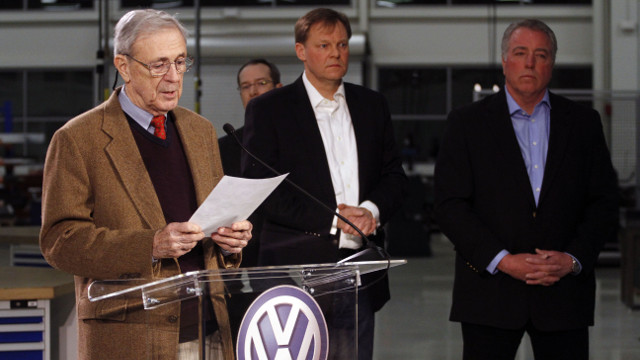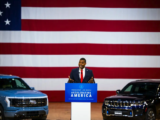
Retired circuit judge Sam Payne, left, announces that Volkswagen employees voted to deny representation by the United Auto Workers union as Frank Fischer, Chairman and CEO of the Volkswagen Group of America, center, and Gary Casteel, UAW Region 8 Director, look on from behind, Feb. 14, 2014, in Chattanooga, Tenn: AP/Dan Henry
Connecting the Dots –
By Joshua Holland –
A three-day election process ended on Friday when Volkswagen workers in Chattanooga, Tenn., voted against joining the United Auto Workers union 712 to 626.
Coming into the vote, both sides knew what was at stake — the union drive was a direct threat to the low-wage economy on which the South’s manufacturing base has been built.
Deep-pocketed union-busters mounted a coordinated campaign against organized labor. They even told Tennesseans that the union wanted to take their guns. And Stephen Greenhouse reported for The New York Times that “Grover Norquist, the anti-tax crusader, helped underwrite a new group, the Center for Worker Freedom, that put up 13 billboards in Chattanooga, warning that the city might become the next Detroit if the workers voted for the union.”
What’s more, Tennessee Governor Bill Haslam said that a ‘yes’ vote would result in the company losing its tax incentives. A powerful state lawmaker called the union drive “un-American,” and Sen. Bob Corker (R-TN) said that he’d been secretly assured that a ‘no’ vote would win the plant the production of a new SUV — a claim the company flatly denied.
Fear campaigns work best in an economy where working people have every reason to be afraid, so the threats were especially potent in a state with an unemployment rate that remains stubbornly high at around eight percent. Tennessee has the fifth lowest median household income in the US.
American unions are accustomed to having adversarial relationships with employers, but in this case the European company publicly maintained strict neutrality on the vote, allowing organizers and anti-union groups to come into the plant and give presentations to its workforce.
Volkswagen is a progressive employer that offers decent wages and benefits. And its Chattanooga facility hasn’t had workplace safety issues like those that have plagued Nissan’s Tennessee plant. The company wants to create the first workers council in the US. The councils give workers a voice in a plant’s operations, and based on its experience in other factories around the world, Volkswagen believed it would give the firm a competitive advantage through streamlined manufacturing processes, lower turnover and ultimately, higher productivity. Under US labor law, a workers’ council can only be created with a union workforce.
In a statement, the UAW said, “We’re outraged by politicians and outside special interest groups interfering with the basic legal right of workers to form a union.” It could ask the National Labor Relations Board to overturn the vote as a result of all the outside interference — and there was some indication that it would after the ballots were tallied — but that would be a long shot.
This was a major blow for an already ailing American labor movement. Art Wheaton, an automotive industry expert at Cornell University’s Worker Institute, told the Los Angeles Times that the loss “significantly diminishes” the UAW’s chances at 10 other foreign-owned auto factories in the South. According to the Times, “since 2011, similar unionization efforts were launched at Nissan plants in Tennessee and Mississippi, Mercedes-Benz in Alabama and BMW in South Carolina.”
At the same time, the battle is not over. VW still wants a workers council, and history has shown that it’s not uncommon for workers to go through multiple votes before finally joining a labor union.
Joshua Holland is a senior digital producer for BillMoyers.com. He’s the author of The Fifteen Biggest Lies About the Economy (and Everything Else the Right Doesn’t Want You to Know about Taxes, Jobs and Corporate America) (Wiley: 2010), and host of Politics and Reality Radio. Originally published at BillMoyers.com.













